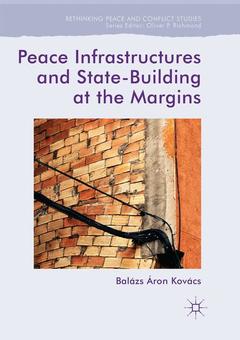Peace Infrastructures and State-Building at the Margins, Softcover reprint of the original 1st ed. 2019 Rethinking Peace and Conflict Studies Series
Auteur : Kovács Balázs Áron

Date de parution : 12-2018
Ouvrage de 303 p.
14.8x21 cm
Date de parution : 08-2018
Ouvrage de 303 p.
14.8x21 cm
Thème de Peace Infrastructures and State-Building at the Margins :
Mots-clés :
Peace; infrastructure; conflict transformation; liberal peacebuilding; state-building; peace infrastructures; 'the local'; hybridity; emergent theory formation; international intervention; armed conflicts; statism; emancipation; The Philippines; PAMANA; Manila; Sorsogon; Presidential Adviser on the Peace Process; counterinsurgency programme; Maoism



